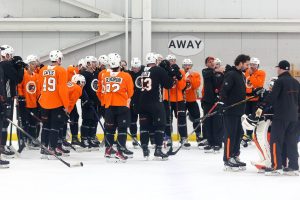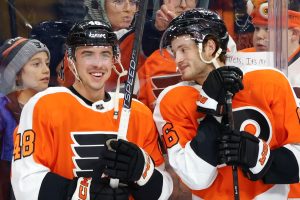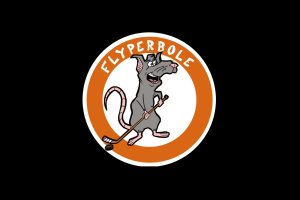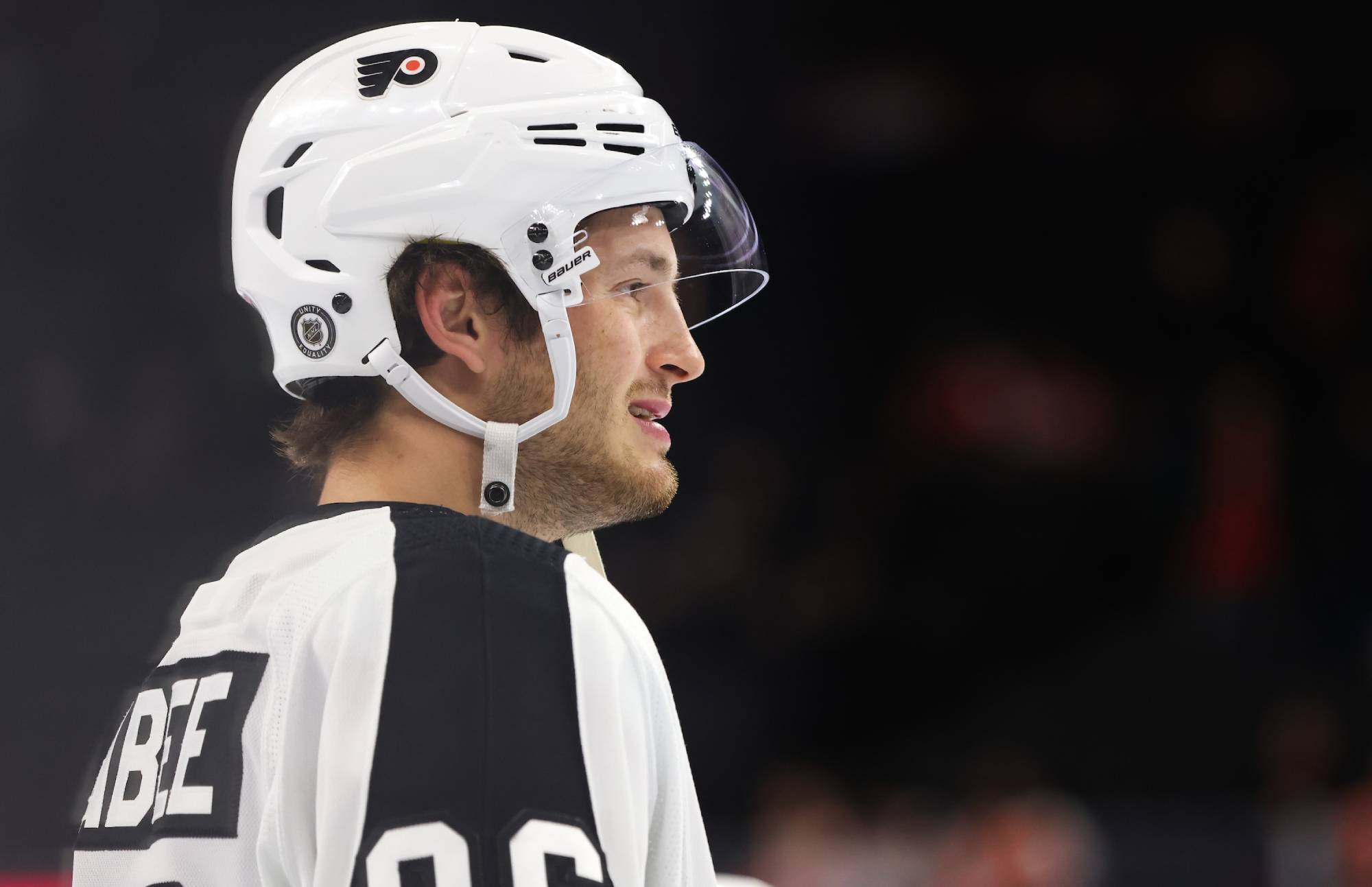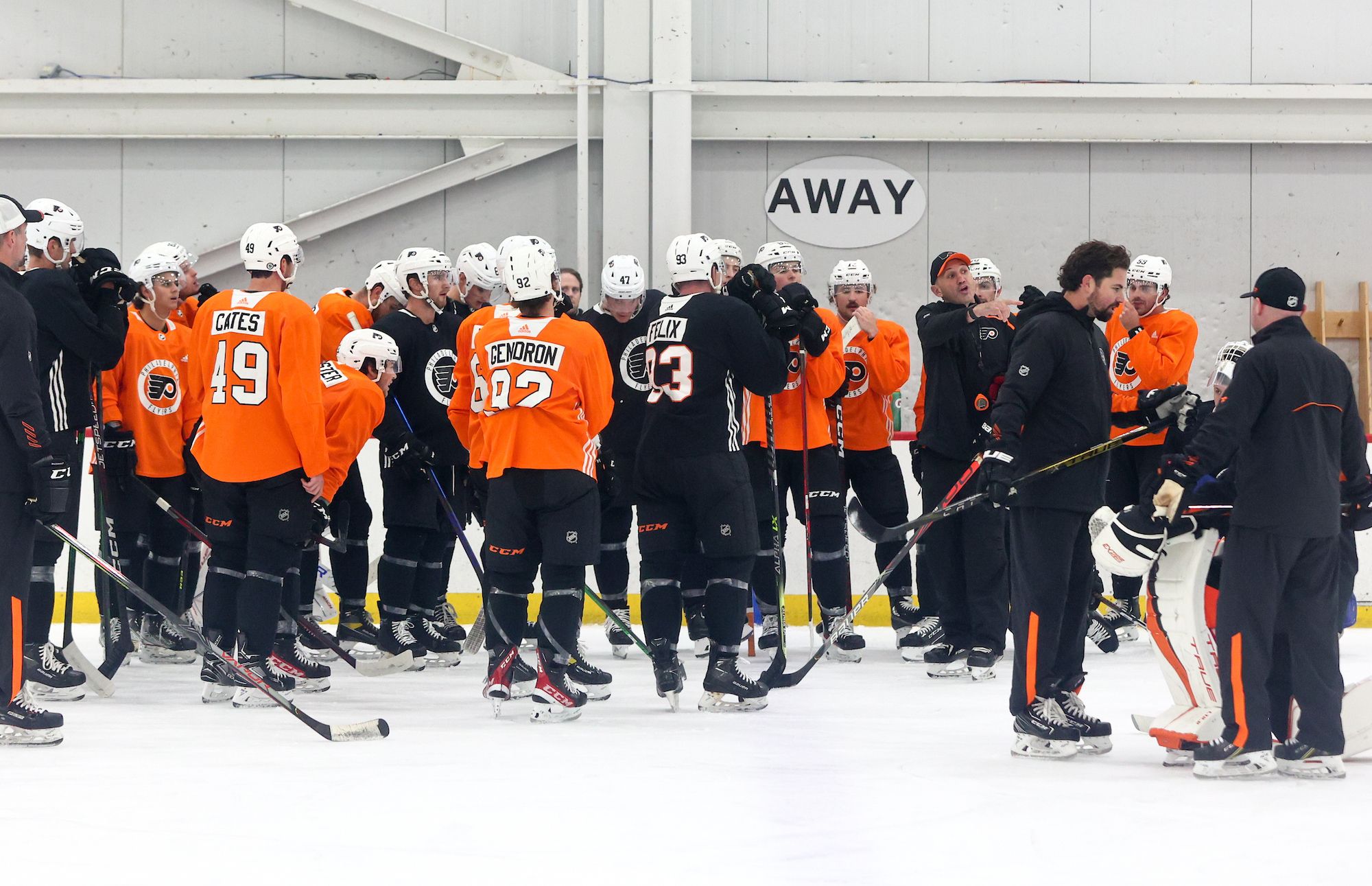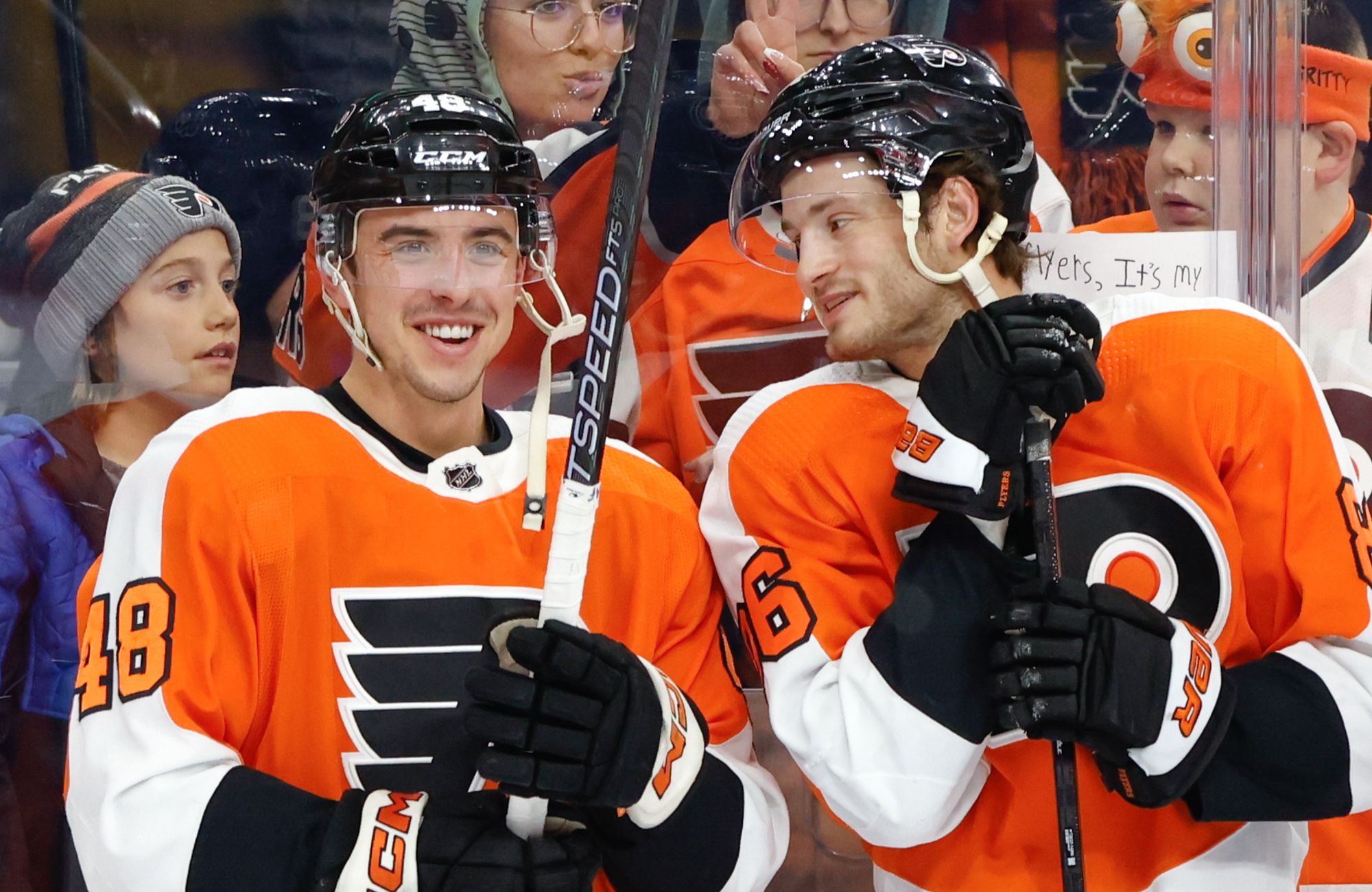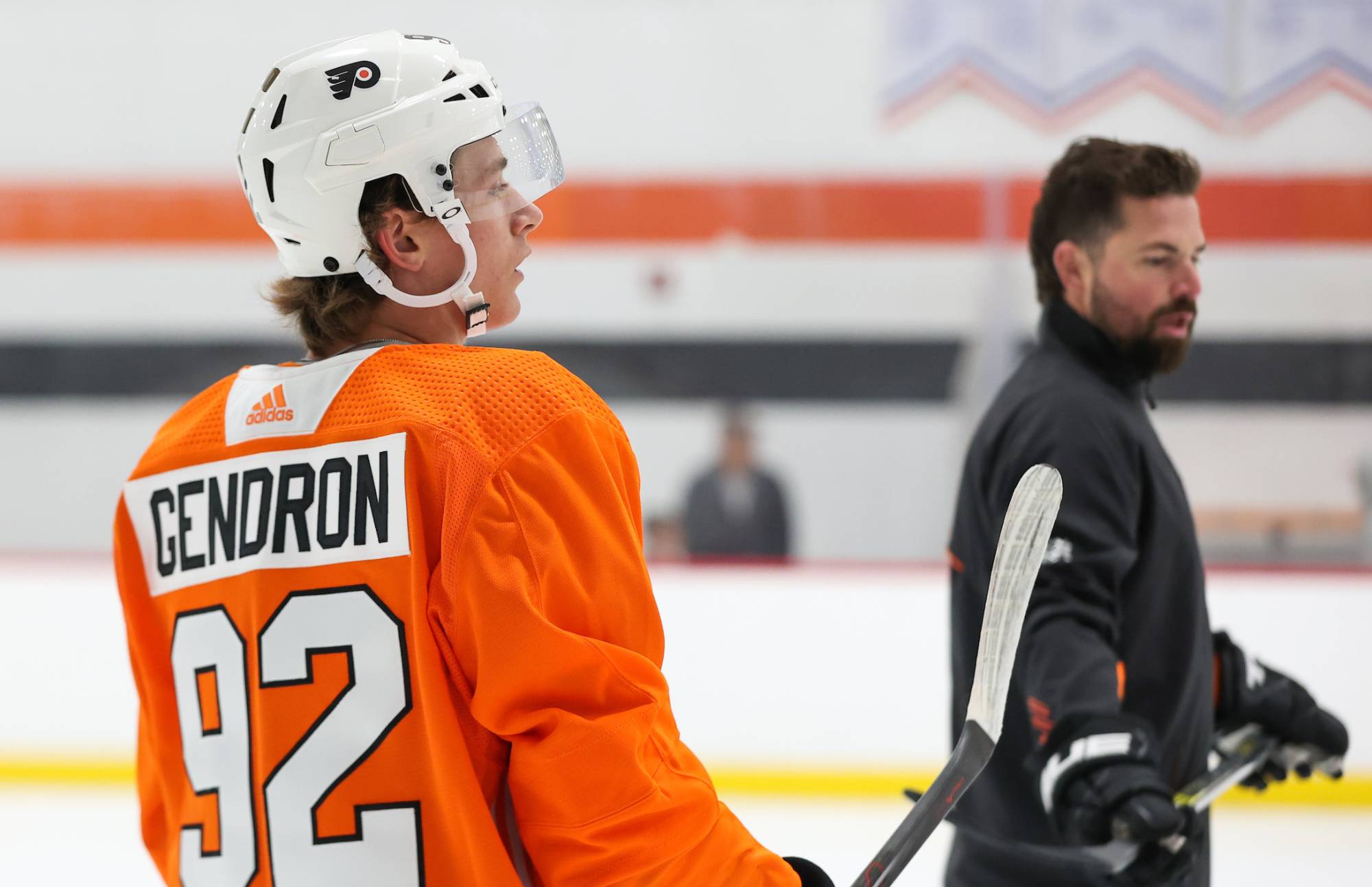Bettman: “Good evening. I’m here to attend the game just like you are.
I don’t have any announcements to make, but I’m happy to take your questions if you have any. If not we can go to dinner and go to the game.”
Q: Can you talk about the draft that’s coming up here and the expectations of it?
Bettman: “Philadelphia, from the outset, has always been a terrific hockey town. When you look at the grassroots level, there were like 14,000 or more kids who were playing in 50 rinks throughout greater Philadelphia. You look at Snider Hockey, which Ed Snider has created; you look at everything the Flyers have done in the community. When you look at the entry of youngsters, our new players, the future of the League coming into the draft, what better place than Philadelphia? What better place than this magnificent building?
And quite frankly, with the hockey enthusiasm here, and the ability to hold major events in Philadelphia, we thought it was a natural fit. We know that the city can host big events. We were here recently with the Winter Classic. We were here recently with the Stanley Cup Final. So all of the criteria for holding a major event are right here, and we’re delighted to be working with the Flyers organization because everything they do is first class.”
 Bruce Bennett/Getty Images
Bruce Bennett/Getty Images What have the early returns been from the League’s standpoint on the new playoff structure?
“The early returns have been terrific. Remember, the playoff structure is a function of realignment. Realignment was done to get teams in a better geography, in terms of where they were playing on the road. So for example, Dallas, which had been in the Pacific, it was a major burden for their fans to watch most of their road games because of the time difference.
Moving Minnesota to the Central, as well, moving Detroit and Columbus East, that was important. The second element that was important in realignment was having every team play in every building at least once, and then third we wanted to emphasize geographic rivalries – both in the regular season schedule and in the playoffs.
When you look at the matchups, whether or not it’s the Rangers-Flyers, or the Bruins-Detroit, this is pretty good stuff. The early returns, in terms of attendance, all the buildings are sold out. National TV ratings and I believe local TV ratings are up. We set out to do something that we thought our fans would like, and the early returns are it’s working the way we had hoped.”
How much concern is there — if this series goes seven games — that neither team will have a day off between Games 6 and 7?
“Well, the fact of the matter is, of all the series, this is probably the series with the least amount of travel. Players are used to playing back-to-back, and as we had to lay out our schedule, it depends on what goes on in all the series, in terms of building availability. We have to hit certain marks for the national TV networks, both in the U.S. and Canada.
Actually, the Flyers are not unrelated to our U.S. national network. We did the best we could based on what was available. Based on building availability and based on television needs that we had to commit to, this is what we had to do. Again, it’s not a long drive between New York and Philadelphia.”
One problem with realignment is there are 16 teams in one conference, 14 in the other. Is there anything that can be done other than expansion?
“Unless somebody wants to move West, and nobody wants to. Columbus and Detroit were adamant that they needed to be in the East. Unless you’re really hung up on symmetry, I don’t think it makes that much of a difference. It’s really the teams in the middle of the pack that are competing for the playoff spots. When you get down to the bottom, whether or not there’s an extra team or two, I don’t think that really affects it because everybody’s roughly playing the same type of schedule.”
Have you gotten complaints from League owners about that?
“No. None.”
There’s an ongoing storyline developing this series about Steve Mason and his upper body injury, whatever it may be. There’s speculation that it’s a concussion.
Given the gravity of a concussion, the attention that’s been focused on that issue, is there any part of you that would prefer teams in general be a little bit more open about these sort of things?
“It’s an interesting question, but the two things don’t line up. In other words, we treat concussions very seriously, and we have a history of being very proactive in that space. We’ve been leaders whether or not it’s working study group going back to ’97, the first sports league to have baseline testing, the first sports league to have protocols for diagnosis and return to play decisions. I don’t know what he has.
So don’t use what I’m about to say as speculation, but the fact of the matter is, if he has a concussion, it’s been diagnosed, and obviously he’s not playing. The question you’re asking about telling the world what a player’s injury is, I’m not sure that our teams and our players would be comfortable with that because this is a very physical game. Putting aside concussions, our players will play injured if they can, and they want to make sure they’re not vulnerable in that regard.”
 Mike Stobe/Getty
Mike Stobe/Getty Is there any update that you can provide about the potential sale of the New York Islanders?
“The last public communication on this was Charles Wang’s statement saying that he is listening to the expressions of interest that he’s getting, and he hasn’t decided whether or not he’s going to take them to the next step. But he is listening. I spoke to him as recently as this morning and his position on that has not changed, but he is getting a number of expressions of interest.”
Could a sale of the team potentially expedite their move to Brooklyn?
“I don’t think so. I think their move to Brooklyn is regulated by their contractual commitment to Nassau County on Long Island.”
Would a possible sale affect the situation with Brooklyn? Would that be open to a new owner or doing something different there?
“Well again, it’s a contractual commitment. The Islanders are committed to move to Brooklyn and they have an arrangement with the Barclays Center.”
How concerned are you with the first week [of playoffs]? There’s been a lot of nastiness whether it’s the Seabrook hit or the open ice hits…
“Is this your first Stanley Cup Playoffs? In the first round? Seriously?”
So you’re not concerned then?
“No. The Stanley Cup is the hardest trophy in all of sports to win. It’s physical, it’s intense, it takes two months. I don’t know, wasn’t there a series either last year or the year before between the Flyers and Pittsburgh? There’s a lot of intensity and passion that our players bring to the ice every night — particularly in the playoffs.”
Would you be in favor of suspensions equaling the amount of games that the player is injured?
“I’m not sure that’s realistic because what if a guy’s actually playing injured and you don’t know it? What if a guy is wearing a short cuff glove and he gets slashed on the wrist and it turns out that if he was wearing a long cuff glove, it wouldn’t have been an injury? I mean it’s too subjective and the likelihood for game playing would be too intense.”
Has the book been closed on penalizing a goalie that leaves his crease in a fight? Here we call it the Ray Emery Rule. Has that been tabled or will it be discussed?
“It’s something that the general managers focus on and I don’t think, at this point, I have anything to report that there will be a rule change. We have a tendency with the managers to be very self-evaluative and I think there will probably continue to be discussions about all aspects of the game, as there always is. It’s always easy to react and overreact one incident.
Obviously if goaltenders were going at it on a regular basis, there would be more of a demand to do something more immediately. We like to be cautious. We’ve been very proactive, as you know. We’ve made lots of changes to open up the game. We’ve made lots of changes to make the game safer, but we do it in a very judicious, studied way.”

Gary, you’ve already announced the next Winter Classic in Washington. When are you going to announce the opponent?
“Probably in the next few weeks. We hope to be in a position to announce what we’re doing outdoors next season in its entirety, instead of doing it piecemeal, and that is a work in progress, but that’s something that we hope in the next few weeks we’ll be in a position to do.”
What is the latest with the possibility of Quebec City as an expansion location?
“We are, much like the Islanders’ owner, we get lots of expressions of interest — whether it’s from Quebec City, Seattle, Las Vegas, or Kansas City — and we’re listening, but we haven’t enacted a formal process to begin considering expansion. That’s not something we’re intent on doing right now, but we are listening.”
Even if they build an NHL arena?
“Well we tell everybody who’s building an arena who doesn’t have a team ‘don’t build it on the assumption you’re going to have a team, build it because you want to build it and if at some point if you get a team, you get a team,’ but that’s not on us. And by the way, I think somebody over there asked me the question about 16 and 14, you know that would create a complication with another team in the East, just as a practical matter.”
Where do things stand with regard to the salary cap projections for next season and the impact of the Canadian dollar?
“The system is designed to deal with fluctuations in the Canadian dollar because hockey-related revenue, which is used to compute the salary cap, is done in U.S. dollars, so if the Canadian dollar goes down, the cap isn’t as high. Don’t hold me to this, we’re somewhere in the $69-70 million as a guess. We don’t have the data; we don’t have all the reports from the clubs yet. It’s premature. That would be a wild guess.
Bill, do you want to disagree?”
Bill Daly, NHL deputy commissioner: “No.”
Bettman: “That’s in the ballpark.”
Daly: “Yes.”
Bettman: “It’s a ballpark guess.”
The original guess was what, $71 million?
“Okay, so.”
But is that fluctuation because of the Canadian dollar?
“Yeah, revenues are strong. The Canadian dollar has an impact because we have seven clubs that earn their revenues in Canadian dollars. We have a national TV contract that’s in Canadian dollars.”
Gary, in your mind, what was the toughest challenge of having [Brendan Shanahan] leave at this time, and how smooth a transition has it been for you?
 Bruce Bennett/Getty Images
Bruce Bennett/Getty Images “Among the many terrific things that Brendan did when he was at the League was that he created a department with knowledgeable, caring, hardworking people. He put processes and systems in place. Stephane Quintal, who is his chief assistant, is now administering supplemental discipline. It’s his decision. Bill Daly’s helping him in terms of the process to make sure if there’s any questions, because Brendan had some time to develop into it.
All things being equal, we would have preferred to wait until the end of the season. Once it was clear that Brendan had an offer from Toronto, I said, ‘You’ve got overnight. You’ve got to either take it or not, and if you’re taking it, you’ve got to go.’ Because in terms of the integrity of the process, I didn’t want any perception that any team had any influence on this.”
Is this in any way an audition for next season in a way for Quintal?
“Well I think that when we get to looking to what we want to do long term, [he’s] one of the people that will be considered, if he is interested in the job. Let’s see how he feels in two months. He is somebody that we will talk to and consider if he is interested. It’s not, as we know, one of the easier jobs, and certainly it doesn’t get criticized much. So depending on how thick your skin is will depend on whether or not you’re interested long term.”
Going back to the outdoor games, if you do the Stadium Series again is there any danger in watering down the Winter Classic?
“No. It’s a great question, but if you think about it, this year we did six games, that’s out of 1,230 regular season games. We did five locations because New York, New Jersey presented some challenges, because we wanted all three teams involved in some way.
The fact is our teams, our fans, our broadcasters can’t get enough of these games, and while there may be, last year a half a dozen games on national television in the U.S. and Canada, the fact is within the markets we are up 350,000 people who bought tickets for them. Six sold out stadiums; fans love the event.
You know from being in Philadelphia what it’s like, what the reaction is, people coming out early, tailgating, the whole deal. I don’t think we’re going to do six again, but we’re going to continue doing it because the demand is there and in part, if you’re a team and you want to be in more than one, you don’t want to have to wait 10 years or so to do it again, and that’s part of the issue. So the stadium series enables us to give more of our fans, more of our teams, the experience.”
Do you like the shootout?

“Well I like the shootout in the way we use it. I wouldn’t like the shootout in the playoffs, and the fact is I like the shootout better than ending the game in a tie. The issue, to the extent that there has been discussion and debate about, is can we tweak overtime so maybe there is slightly fewer shootouts.
But the fact is no matter what your opinion is — either from the media, a hockey person or a fan — watch the buildings when the shootout is going on. Everybody is on their feet, everybody is interested, everybody is watching. When games were ending in ties that wasn’t so much the case than overtime.”
When GMs were discussing this, at least to some degree, last fall and also recently, were you watching the buildings at that time? Were you of an open mind to kind of see how that overtime could be tweaked?
“We were actually talking about going to some tweaks such as the long change in overtime to see if that takes it down. Nobody is looking for a fundamental adjustment, we’re looking more for a tweak to see if we can get a few more games decided in overtime than the shootout, but the shootout is a concept here to stay, and I think overwhelming the fans will tell you they like it for the regular season better than a tie for sure, and you know as a practical matter we can’t play games in their finality the way we do in the playoffs.”
Aside from the obvious thing that the fans like the shootout, do you like it?
“Yeah, I like it because the fans like it. We do what we do to make it fun and exciting, and entertaining for our fans, it’s what it’s all about. It’s about the game on the ice and how our fans connect to it.”
Is there any perception of, you saw Kovalchuk leave for the KHL, you hear about the league’s aspirations, where do you guys come down as a source of competition?
“The best hockey players in the world play in the NHL, and the best hockey players in the world will continue to want to play in the NHL. I know that hockey is very important to Russia and the Russian psyche. I know it’s very important to President Putin, he told me that himself.
KHL has its place in Russia, but in terms of what is the best hockey league in the world, it’s the NHL and the NHL will stay that way. We occasionally get a player for whatever reason who decides he would rather play in the KHL. Individual’s choice.”
***
transcripts courtesy of Flyers PR

